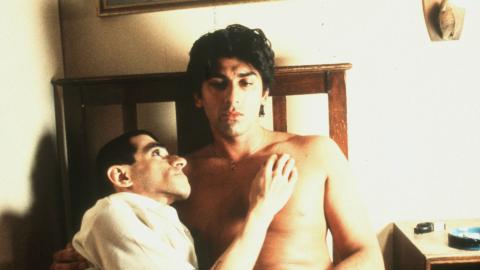This film is currently unavailable

Sixth Happiness

Funny, acerbic and moving story of a young man's sexual awakening as family life crumbles around him.
Director: Waris Hussein
Overview
Bombay, 1962: Sera Kotwal (Souad Faress) gives birth to Brit (Firdaus Kanga), a boy whose bones are so brittle that he can just hiccup and break a rib. Based on Kanga's acclaimed autobiographical novel, Trying to Grow, Sixth Happiness is the funny, acerbic and moving story of a young man's sexual awakening as family life crumbles around him.
Located within Mumbai's Parsee community, the film shows a thoroughly non-stereotypical Indian family. With powerhouse performances from Kanga and Faress, and featuring great support from Nina Wadia (Goodness Gracious Me), Indira Varma (Bride and Prejudice, Game of Thrones) and Meera Syal (The Kumars at No. 42), Sixth Happiness manages to turn just about every stereotype about India, disability and sexuality on its head. Firdaus Kanga, who also wrote the screenplay for the film, describes the story as a 'reimagination' of his childhood and youth. Blurring the boundaries between fact and fiction even further was the decision to cast Kanga himself in the role of Brit even though he had no experience as an actor. Kanga's creation – both as writer and performer – resists drawing Brit as either martyr or victim. Brit is bright, spiky, opinionated and selfish with a razor-sharp tongue. He prefers the Kama Sutra to Shakespeare and does not allow gender to come in the way of his desire for sex. Back in 1997 when Sixth Happiness was released theatrically, South Asian culture had yet to break into the Western mainstream. Just a few years later and audiences were flocking to see East is East, Bend it Like Beckham and Bombay Dreams; Goodness Gracious Me and The Kumars at No. 42 brought a new kind of comedy to millions of British homes. Even after this cultural revolution, Sixth Happiness still appears extraordinarily radical, boasting a heady brew of bisexuality, disability, dysfunctional families and suicide.
Related

Caligula: The Ultimate Cut Caligula: The Ultimate Cut
Period drama 2023 178 mins Director: Tinto Brass
Malcolm McDowell and Helen Mirren star in one of the most controversial films in cinema history, presented here in an entirely new cut compiled from the original rushes.

Tchaikovsky's Wife Tchaikovsky's Wife
Drama 2022 144 mins Director: Kirill Serebrennikov
Award-winning director Kirill Serebrennikov (Petrov's Flu) charts the tumultuous relationship between the 19th-century composer and his wife, in this poignant and powerful biopic.

Anselm Anselm
Biopic 2023 94 mins Director: Wim Wenders
Wim Wenders' stately and beautifully scored study of Anselm Kiefer.

Werner Herzog: Radical Dreamer Werner Herzog: Radical Dreamer
Biopic 2024 90 mins Director: Thomas von Steinaecker
A riveting and all-encompassing portrait of the iconic German filmmaker.

Rebel Dread Rebel Dread
Biopic 2021 83 mins Director: William E. Badgley
This is the story of the iconic Don Letts, the coolest cultural polymath – narrated by the man himself.

Vita & Virginia Vita & Virginia
Biopic 2018 110 mins Director: Chanya Button
Gemma Arterton and Elizabeth Debicki relive a literary love affair, fiery and forbidden, with a remarkable legacy.

Victim Victim
Crime 1961 100 mins Director: Basil Dearden
This thought-provoking classic stars Dirk Bogarde as a homosexual lawyer who risks his career to hunt down a blackmailer.

Caught Looking Caught Looking
Drama 1991 35 mins Director: Constantine Giannaris
Years before Grindr, a gay man turns to virtual reality to satisfy his sexual fantasies in this strangely prophetic short film.

Dream A40 Dream A40
Drama 1965 16 mins Director: Lloyd Reckord
A young gay couple’s relationship is put to the test as a road trip takes a sinister turn in Lloyd Reckord's daring underground short.

Nighthawks Nighthawks
Drama 1978 113 mins Director: Ron Peck
A schoolteacher juggles everyday life with nights spent cruising for Mr Right in this fascinating landmark in British gay cinema

What Can I Do with a Male Nude? What Can I Do with a Male Nude?
Comedy 1985 24 mins Director: Ron Peck
Ron Peck tests the thin line between pornography and art with his amusing rumination on the difficulties of showing the naked male form.

Nighthawks 2: Strip Jack Naked Nighthawks 2: Strip Jack Naked
Documentary 1991 91 mins Director: Ron Peck
Ron Peck’s experimental follow up to the groundbreaking Nighthawks is both a making-of documentary and a deeply personal film memoir.

Reawakening Reawakening
Thriller 2024 90 mins Director: Virginia Gilbert
BAFTA-winner Jared Harris stars as a father wrestling with uncertainty when his daughter reappears a decade after vanishing.

A Night of Knowing Nothing A Night of Knowing Nothing
Drama-documentary 2021 99 mins Director: Payal Kapadia
All We Imagine as Light director Payal Kapadia’s bold and distinctive feature debut explores the political climate of contemporary India.

Caligula: The Ultimate Cut Caligula: The Ultimate Cut
Period drama 2023 178 mins Director: Tinto Brass
Malcolm McDowell and Helen Mirren star in one of the most controversial films in cinema history, presented here in an entirely new cut compiled from the original rushes.

All We Imagine as Light All We Imagine as Light
Romance 2024 118 mins Director: Payal Kapadia
Payal Kapadia’s Cannes Grand Prix-winning portrait of three women is a transcendent tale of love and sisterhood.

The Universal Theory The Universal Theory
Thriller 2023 118 mins Director: Timm Kröger
The spirits of Lynch, Lang and Hitchcock haunt this cold war mystery-thriller with an awesome Alpine backdrop.

The Love Witch The Love Witch
Comedy 2016 121 mins Director: Anna Biller
A modern-day witch uses spells and magic to get men to fall in love with her, in Anna Biller's outrageous tribute to 1960s Technicolor melodramas.